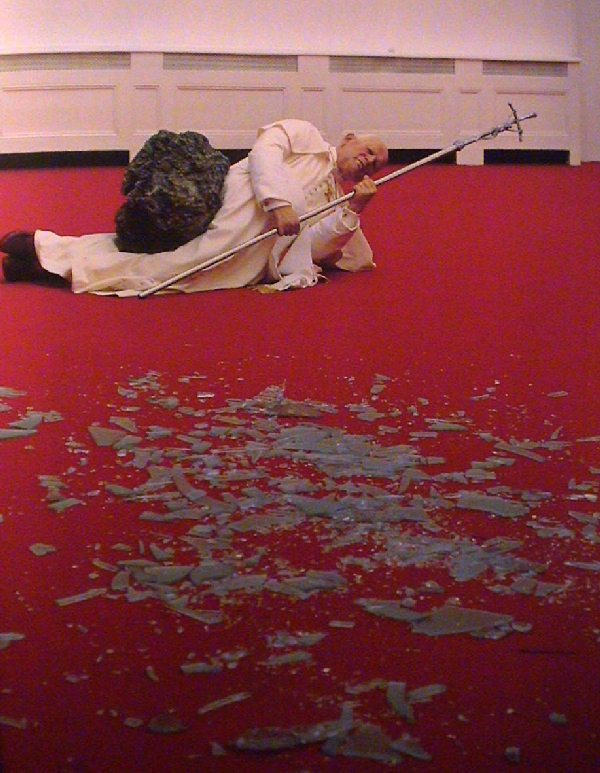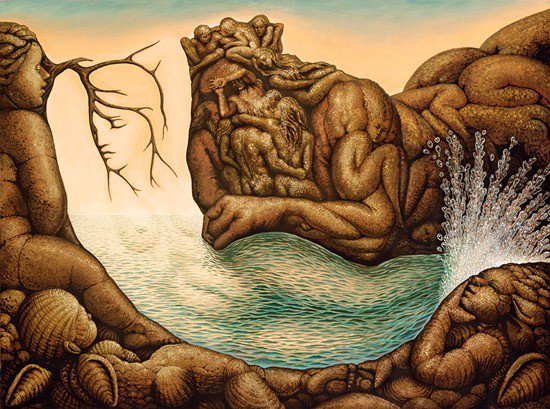|
|
|||||||||||||||||||||||||||||||
|
Behind the Atheist Upsurge
Atheism fueled by disillusionmentJune 23rd 2007. "A ludicrous obscenity." That's what Richard Dawkins calls raising children to believe they belong to a particular religious family. "Religion poisons everything," says fellow atheist Christopher Hitchens. Charges like these – and they are but a hint of the full torrent of anti-religious vitriol now on shelves in bookstores across the continent – have left many people today shocked and puzzled. A generation accustomed to best-seller lists dominated by books on faith and spirituality is currently aware of towering best-sellers attacking every facet of religious practice and belief. Books such as The End of Faith and Letter to a Christian Nation by Sam Harris, The God Delusion by Oxford science professor Richard Dawkins, and God is Not Great: How Religion Poisons Everything by journalist Christopher Hitchens, have stayed at the top of the book charts now for almost innumerable weeks on end. And they show no sign as yet of fading. Those who feel their faith deeply threatened by all of this, as well as uncommitted general observers of the social scene, are asking, why is this happening and how is such a development to be assessed? There is no one simple answer because the reasons are as diverse as they are complex. But one thing is certain: This reaction to the gross excesses of religious rhetoric, not to mention the crimes against humanity, committed today in the name of God by factions and members of virtually every faith community, was as predictable as tomorrow's sunrise. Each of the attackers of belief in God is venting, among other things, the growing disillusionment and yes, disgust, of the many millions around the world who are aware not just of the scandals rocking religious institutions but of the pious veneer hiding not-so-subtle attempts by religious literalists to thwart the progress of science and to belittle human reason itself. What these atheist voices are expressing is a long-repressed anger at the oppression, ignorance and violence that religion has too often both encouraged and blessed. There is no need to catalogue the list of harm done; Harris, Dawkins, Hitchens and a growing number of other writers have only too well detailed the various ways in which religion has gone sour in our time. Most notably, they all (with the exception of Hitchens) address the spectacle of a "born-again" U.S. President George W. Bush, ignoring completely a centuries-old Christian tradition of the so-called "just war" and its principles in favour of a pre-emptive invasion of another sovereign nation. The vast loss of life, wealth and general stability worldwide brought about by Bush and his cronies, all in the professed conviction they are doing God's direct will, has sickened the majority of citizens around the world. In other words, the atheists are engaged in massive seat-kicking and religion provides an enormous rump for a target.
Significantly, their onslaught comes at a time when all the major polls reveal a widespread and dramatic decline in religion's influence and in religious practice not only in Britain and the rest of Europe, including such formerly staunch Roman Catholic countries as Ireland, Poland and Italy, but even in the overtly religious United States itself. In the U.S., only the millions of immigrant Latinos have kept the actual figures from coming ever closer to those of Canada. Here, where secularism, the prevailing modern world view, is much more pervasive than among our American neighbours, close to 20 per cent of the population says it has "no religion" at all. Church and synagogue have severely diminishing regular congregants and whose average age is in the mid- to high '60s. Yet, and this is true elsewhere as well, an overwhelming majority of nearly 80 per cent of Canadians report that they see themselves as "spiritual," or as having their own spirituality. They just don't feel a need for, or the relevance to their lives, of formal religious affiliation. Some religious leaders and their keenest followers put a religious spin on the atheist "pushback." They theorize that God may be using a paradoxical instrument to correct the sins of the would-be faithful. They suggest the present literary polemic against faith in God is necessary to bring the world's religions to a day of radical judgment and of true repentance. That may or may not be true. But, the reality is – certainly in the case of Christianity – that the core message itself needs to be re-examined and changed since it no longer makes sense or communicates to contemporary men and women. There is a need for less literalism and more awareness of the importance of metaphors and true myth in any God-talk. It is one thing, however, for the atheists to point out religion's manifold excesses, absurdities, and distortions. Making the huge leap from that to insistence on an atheistic creed is something else. My philosophy tutor at Oxford was an atheist and I grew to respect him in spite of the gulf between us. But, he clearly was a believer of a kind. His stance that there is no God (a-theos means literally "without God") was based every bit as much on an unprovable, non-rational intuition or faith/belief as was my own.
It needs to be recognized that all atheists, including Hitchens, Dawkins and Harris, are just as fundamentalist about their position as any literalistic Christian or extremist Muslim is about their faith today. They, too, are people of faith, albeit a negative one. For the believer in God today who is shaken by the current tide of atheism, there is work to do. For those with a desire to fully recognize and know the divine presence at the centre of their life, this is a clarion call to shake off a Sunday-school level faith and to read widely using both intellect and compassion to the maximum. C.S. Lewis, C.E.M. Joad, and Malcolm Muggeridge were all famous atheists who, to their own surprise, one day suddenly "saw the light." What would not be surprising would be if the next big best-seller from one or more of today's ardent atheists were to bear the title "How I found God."
Some prominent non-believers"The Bible is not my book nor Christianity my profession. I could never give assent to the long, complicated statements of Christian dogma." - Abraham Lincoln, American president 1861-1865. "I cannot imagine a God who rewards and punishes the objects of his creation, whose purposes are modelled after our own – a God, in short, who is but a reflection of human frailty. Neither can I believe that the individual survives the death of his body, although feeble souls harbour such thoughts through fear or ridiculous egotism." - Scientist Albert Einstein "You never see animals going through the absurd and often horrible fooleries of magic and religion. Only man behaves with such gratuitous folly. It is the price he has to pay for being intelligent but not, as yet, intelligent enough." - Author Aldous Huxley. "Creationists make it sound like a 'theory' is something you dreamt up after being drunk all night." - Author Isaac Asimov "Religion is just mind control." - George Carlin, comedian "It's an incredible con job when you think of it, to believe something now in exchange for life after death. Even corporations with all their reward systems don't try to make it posthumous." - Gloria Steinem, women's rights activist
|
|
||||||||||||||||||||||||||||||
|
Website Design + SEO by designSEO.ca ~ Owned + Edited by Suzanne MacNevin | |||||||||||||||||||||||||||||||



